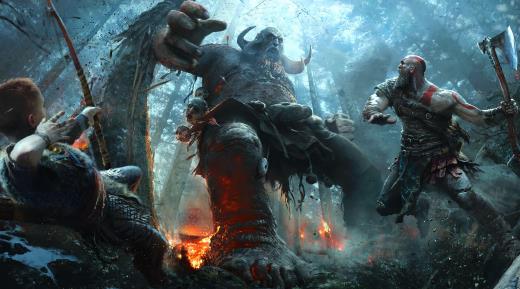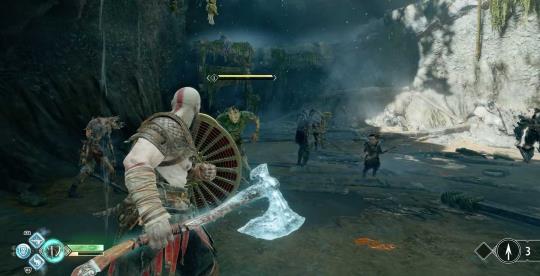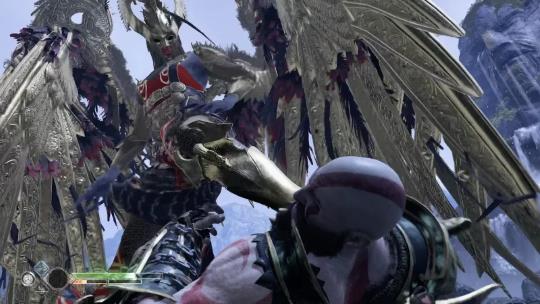Game Log: God of War

Pure objectivity is an impossible standard of evaluation to achieve. The odds of someone being capable of analyzing a piece of art in such a manner are astronomically low. You’d need to first cast aside the heart necessary to appreciate expressive works in the first place. A critic must first love the art being evaluated enough that deeper study and efforts of understanding become a natural compulsion.
To that end, God of War is a pain in my critical butt. I hold no substantial familiarity with the prior games aside from marketing, E3 gameplay demonstrations, and the opening level to the debut title. I was not excited for this new entry at all, and even found its new direction an obnoxious plea to be perceived as meaningful and mature. I was upset on behalf of fans that Sony would try and force a bloody action franchise into a trendy new presentation rather than craft an all new property or maintain the series’ spirit.
The endless adulation of the press did nothing to budge my interest meter. It was only through the adamant nagging of my titular podcast co-host Steve that I relented. I finally played God of War.
I fell in love.
The questions bogging down my mind are what, precisely, it is I fell in love with, and why, despite that love, I fail to see the milestone of craftsmanship the press have promised God of War to be. Every step of the way my mouth burst forth with complaints and criticisms, but after several hours I simply forgave its trespasses for what pleasures it provided. The gold that glitters brightest in this game is all optional. The promised riches of the campaign appear dull to me even in the bright shine of cloudless daylight.
I am uncertain how to progress from here. So many critics and reviewers before me desperately sought to conceal every possible detail of the game, counting on opaque enthusiasm to sell consumers a spoil-free experience. I suppose enough months have passed to trust plenty of details have become common knowledge, but even so I’ll proceed first where my love began: exploration.
God of War is not an open-world game. It contains a hub with a variety of carefully crafted environments littered with cul de sacs and alleyways, each holding secret treasures and tiny teasers of the brain. These are the real highlights in the early hours of limited – I dare say frustrating – combat. Despite funneling the player from one arena to the next, Kratos’ lack of crowd control at this stage feels as if the game is tossing the player about like a monkey in the middle. As many high-octane action fans have already pointed out, the camera bears a close over-the-shoulder proximity to Kratos that limits his – and thus the player’s – peripheral vision. Flanking foes are granted plenty of lethal leeway as they leap and charge at Kratos from all angles at every opportunity. Whereas a game like Resident Evil 4 modified enemy behavior and the design of its levels to work with a new camera, God of War seems designed with the intent of the camera being stuck somewhere in the ceiling or trees.
If I had to hazard a guess why this is frustrating for some players, it’s due to the over-the-shoulder camera emphasizing the player’s attention to a limited portion of the screen. Yes, God of War has a series of arrows surrounding Kratos that flash pink or red when an incoming projectile or melee attack is headed his way. The problem is the player is focused on the area surrounding Kratos to find a target. In other shooters, damage indicators will either appear around the center cross-hair or begin to cover a huge chunk of screen real estate. Instead, God of War asks the player to pay attention to the one section they’ll never target: Kratos himself.
This is why the icons flash so vibrantly and violently. However, this is only enough to grab the attention from the player’s periphery, competing with the varied openings of enemy swings or bright indications of incoming spells. It is just one of many pieces of feedback informing the player of a new attack to avoid. Unlike the striking foes before Kratos, the enemies at the side or behind are an unknown distance. Even if the player sees the warning they may not have the time to properly respond.

“You need to be playing the game like a shooter,” Stephen would tell me. I could never grasp this sentiment, unless the shooter in question was DOOM. It seemed to me that the only answer was to constantly be on the move. While this works wonderfully in the game’s later hours, Kratos’ axe strikes down like a branded foam replica found in the grocer’s toy aisle in the game’s opening hours. Even the dregs of the enemy’s horde take a long series of repetitive swings to split apart. Mobility is hardly the player’s instinct at such a stage.
Given these early pains of adaptation it is no wonder that ducking into a hidden path to solve the riddle of rune locks was a welcome respite. Unlike each encounter with monsters I didn’t feel as if I were at odds with the game’s very designers. No wonder so many on social media were recommending the difficulty be knocked down a notch or two for maximum enjoyment! If only the rewards for spelunking felt… well, rewarding.
Chests of treasure largely provide materials necessary for the player to forge and upgrade new armor sets, or a variety of enhancements to slot into said gear. This causes much of the game’s difficulty not to be gated by player skill, but to instead be gated by gear level. Having trouble with some hard-hitting foes? Return later with some buffed up gear.
God of War’s intention is to provide a variety of armor sets and enhancements to appeal to a variety of play styles and situations, but it doesn’t feel as if swapping gear would be advantageous. In fact, it felt as if the game worked against such gear swapping. Aside from the tougher optional challenges demanding a greater mastery of all combat mechanics, the user-interface provided no friendly way to compare armor statistics without enhancements applied, or to swap enhancements from one piece of gear to another. By time the player starts getting gear worth swapping out, the habit of seeking bigger global numbers has already been established. In fact, no matter where you are in the game, there’s always gear with greater numbers to be had. If the intent was to swap based on style, then the worst idea was to apply statistics and number-values to the gear. Limiting oneself to gear that specializes in Runic abilities or ranged fighting is to welcome a handicap. Perhaps with hours of practice such a specialty can manage to take out even the toughest of foes, but as the game is built the intent is to have too broad an appeal.
The majority of rewards are thus diminished. The act of collecting itself may be enjoyable and engaging, but the utility of Kratos’ prizes is made forgettable by the game’s own systems. The armor forging and upgrading do not provide depth but distraction. A pittance of a carrot on a string. I say these rewards are more akin to spending several minutes in a Legend of Zelda game making your way to a chest only to discover a purple rupee for your already bursting wallet.
There is but one location where this system shines. Niflheim, a realm shrouded by a poisonous mist. Kratos can only dive into the gaseous maze for so long before succumbing to the toxic air. If he wishes to survive longer he must collect materials from within the trap-and-beast-infested labyrinth to forge specialty equipment boosting his resistance to the mist. These very materials are also necessary for cracking open the most treasured caskets at the labyrinth’s center, or sealing the gateways responsible for the poisonous gases.
Niflheim can only be reached after collecting a series of ciphers. It is the only part of the game where all of the mechanics seem to feed into each other, but only a percentage of players will have access to it. The rewards are tangible to the purpose of the realm and feed a desire to the player to push onward, testing how much further they can go with each upgrade and endeavoring to keep collecting for superior rewards. Consequently, the armor happens to be some of the best available in the game, meaning even a surface level of participation yields positive gains.

thats-my-fetish.gif
That is what I mean when I say the optional content is the best God of War has to offer. It is true that merely following the campaign’s natural progress will reward the player with new combat attacks to unleash and new armor to equip, but any true mastery of mechanics is never offered by the campaign. Even the boss fights are littered with quick-time button mashers, more simple than even the most predictable of Zelda dungeon bosses.
Climb the cliffs of Muspelheim, on the other hand, or seek the hidden chambers concealing the cursed Valkyries, and the player will find themselves forced to actually understand all the moves Kratos has at his disposal. The campaign may offer dazzling cinematics to pantomime the excitement of a Hollywood blockbuster, but these smaller-scale sparring contests are what really get the blood pumping. Be it the need to learn each Valkyrie’s patterns, invulnerabilities, and openings, or struggling to fulfill the optional demands of Muspelheim’s trials, God of War finally drove me to understand what made Kratos a God and not a puny human.
That’s the problem, though. This iteration of God of War is not intended to appeal to an enthusiast demographic that looks forward to learning the game’s rules. It was designed to appeal to as broad a base as possible so that it could be uttered in the same breaths as The Last of Us. Any embarrassing shreds of its past self are cast aside in favor of earning the respect of those that would deny video games the moniker of “art”.
I don’t lament the new direction God of War has taken any longer. It proved that its combat could work given the right circumstances. Seeing as I feel no need to apologize for this medium I love I find the story to be adequate rather than excellent. It’s good! It is not, however, even close to my favorite video game narratives, and is certainly outdone still by the best of film. Nevertheless, if you’re going to build a game to appeal to a broad audience, you can certainly do worse. God of War manages to include something for everyone to love.
It just took a while for me to find that something to love.
To hear more of my thoughts on God of War, listen to our episode for it on the Eh! Steve! podcast.


